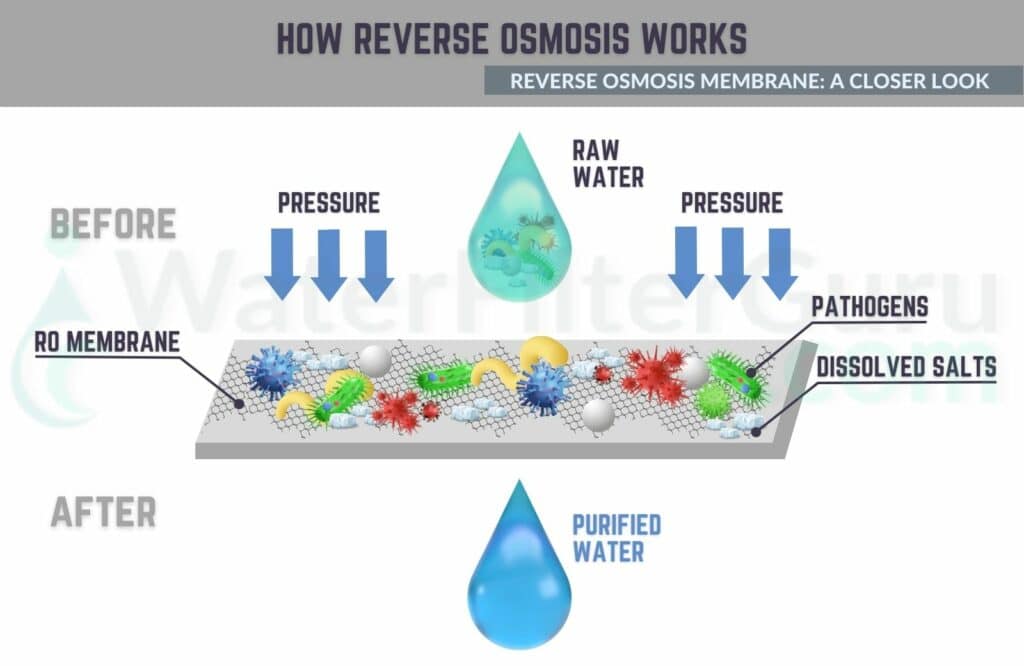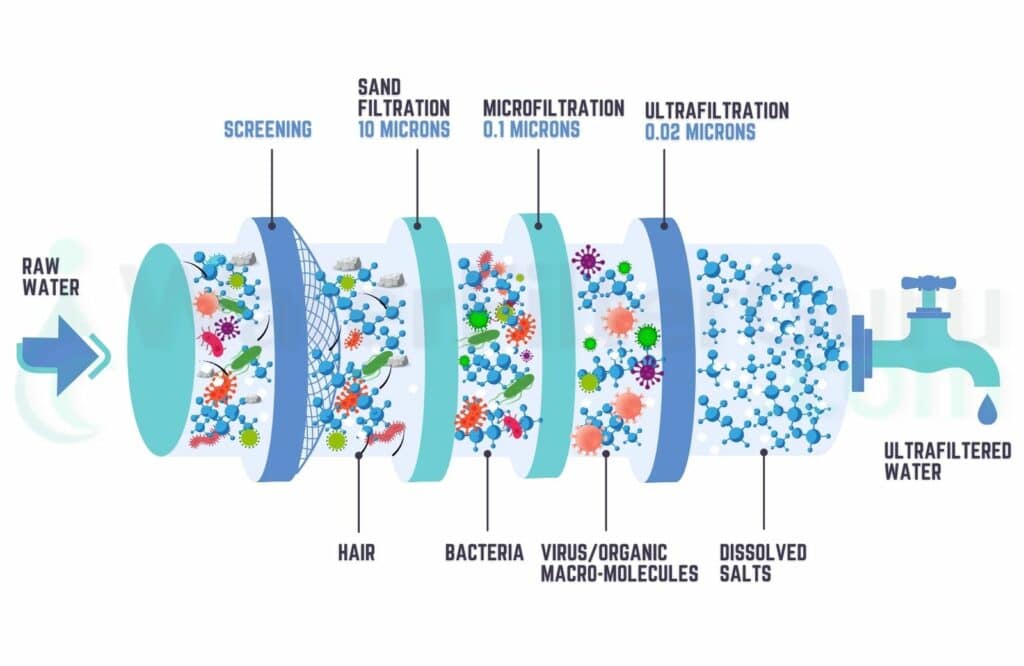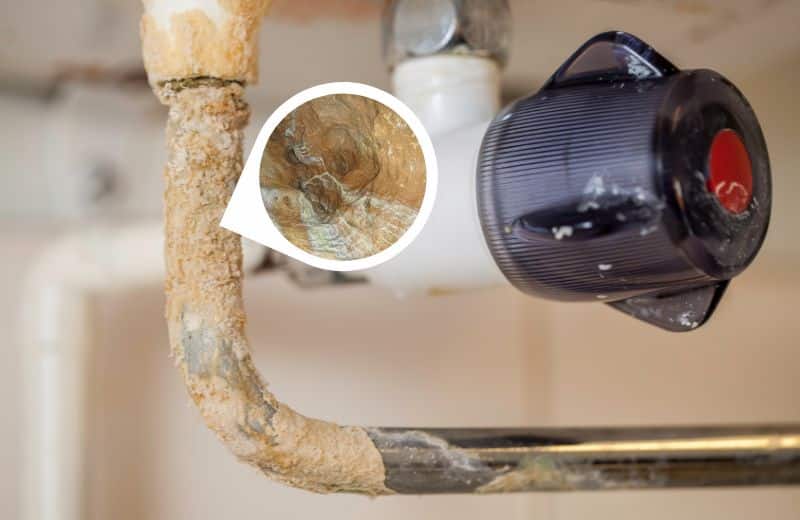Calcium is a healthy mineral that humans need to survive. But calcium in your tap water leaves damaging deposits on surfaces, known as limescale.
In this guide, we’ll be sharing what we know about water filter systems for calcium removal, including whether any types of filters can remove calcium, and our recommended method for removing this mineral from your water.
Let’s start with the short answer: Some filters, like reverse osmosis filters and ultrafiltration membranes, can reduce your water’s calcium content. However, if your water contains high concentrations of calcium, your best solution is to use a water softener, not a filtration system.
Table of Contents
📤 Can a Water Filter Remove Calcium?
A water filter system typically uses multiple filter stages to remove a set of contaminants, such as chlorine, heavy metals, volatile organic compounds, and other harmful substances.
The average whole house water filter isn’t designed to remove calcium from water. However, some filters have a micron rating that’s small enough to trap large flakes of calcium, helping to reduce this mineral in water somewhat.
📖 What Types of Filters are Best for Calcium Removal?
First off, it’s important to know that there’s no such thing as calcium water filters. There are no filters that are specifically focused on calcium filtration. That’s because most filtration technology, like activated carbon and KDF, is simply incapable of removing this hard water mineral.
The best calcium water filter isn’t actually designed to filter calcium – it’s just an added bonus. The two filters that can reduce calcium are reverse osmosis systems and ultrafiltration systems.
Reverse Osmosis
A reverse osmosis water filter contains a semi-permeable membrane, which consists of tiny pores that trap the majority of contaminants, including calcium and magnesium.
Calcium is too large to pass through the RO membrane and is repelled into the RO chamber. Here, calcium and other contaminants are flushed down a drain with a small amount of wastewater.
A reverse osmosis system can remove between 92% and 98% of calcium carbonate and magnesium minerals from drinking water.

Ultrafiltration
Ultrafiltration, like reverse osmosis technology, is a membrane filtration process that uses a hollow fiber membrane to trap contaminants as small as 0.01 microns. UF membranes don’t remove contaminants quite as small as RO membranes, but they’re still capable of removing calcium in hard water.
An ultrafiltration system can remove around 50% of calcium from drinking water. There’s no guarantee that an ultrafiltration system will remove any calcium from your water – some UF systems are advertised to remove this mineral, while others aren’t.

👎 What are the Setbacks of Using a Water Filter to Remove Calcium?
We wouldn’t recommend using any types of whole house water filters to reduce calcium. Even though a reverse osmosis system is capable of removing this mineral, that’s not what they’re designed to do.
Calcium is a damaging mineral that sticks to all the surfaces that it comes into contact with – including RO membranes. When calcium begins to form scale over a filtration membrane, the membrane loses its efficiency, and is unable to remove contaminants as effectively as it’s intended to.
Using a reverse osmosis under-sink water filter to reduce calcium will likely cause the membrane to lose efficiency before the end of its expected lifespan. That’s why most reverse osmosis and ultrafiltration systems require pre-treatment to reduce calcium and magnesium before they can enter the system.
There’s also no guarantee that a whole house water filter will even reduce calcium in your water, and it certainly won’t produce completely soft water. RO may only slightly reduce calcium, and ultrafiltration might not remove this mineral at all. Whole house water filters simply aren’t intended for calcium reduction.

💯 What is the Best Way to Eliminate Calcium from Water?
Water Softener
The best way to eliminate calcium from water is with a water softener.
Water softeners are solely designed to soften hard water. A water softener removes calcium in a process called ion exchange – they replace calcium and magnesium with minerals that can’t cause scale, like sodium or potassium ions.
A water softening system is installed at your home’s point of entry, so it can treat water before it enters your water heaters. This means you can enjoy softened hot and cold water around your home.
Water softeners don’t just reduce calcium concentrations – they completely eliminate water hardness, preventing limescale formation for years.
A water softener has a different setup than a whole house water filter. While filtration systems have cartridges that need to be replaced, water softeners need regular salt top-ups to continue to operate.
The average cost of a water softener is $1,000-$2,000. If you’re looking for the right calcium water filter to tackle hardness minerals, a salt-based softener is worth the investment.
👉 Read our reviews of the best water softener systems (updated for 2025).

Water Conditioner
Don’t fancy adding salt to your water, but still looking for a more effective way to tackle water hardness than a whole house water filter?
A salt-free water conditioner is another effective means of calcium water treatment. This system uses a crystallizing process – such as template-assisted crystallization – to prevent hardness minerals from sticking to surfaces and forming scale.
The big difference between water softeners and water conditioners is that water conditioners don’t actually remove the calcium from your water, so your water quality won’t change, and you’ll still get the same daily calcium consumption from your water. However, the calcium and magnesium ions in your water will no longer be able to form scale deposits.
Water conditioners cost about $1,500-$2,200. They’re not quite as effective at tackling scale-forming calcium as salt-based systems, but they’re much more effective than whole house filter systems.
Continue Reading: Top Salt-Free Water Softeners of 2025 Reviewed
🧠 Water Filters for Calcium Removal FAQs
What’s bad about calcium in water?
Calcium in water is completely safe to drink, but excessive calcium can form limescale in pipes and water-based appliances. Calcium is known as a hard water mineral, and leaves sticky deposits in your plumbing, around your faucets, in your toilet, on your showerhead, and in your dishwasher and washing machine. Limescale is incredibly damaging, affecting the efficiency of appliances like your hot water heater, and the only way to prevent scale formation is by removing limescale.

Does the Brita filter remove calcium?
No, neither the Brita Standard filter nor the Brita LongLast can reduce calcium ions.
How do you remove excess calcium from water?
To remove excess calcium from water, consider installing a water softener. If you just want to remove excess calcium from your shower water, and you don’t want to actually soften your home’s water supply, consider a shower filter that can reduce hardness.
Do water filters remove hard water minerals?
No, most filters, like activated carbon and KDF filters, can’t remove hard water minerals. There’s no such thing as a calcium filter for hard water. Some filters, such as reverse osmosis systems, have small enough pores to reduce some hardness, but high hardness can damage the RO membrane.
Do any water filters remove calcium?
Yes, some filters remove calcium from water. Reverse osmosis and ultrafiltration are the best filters for calcium removal. Keep in mind, though, that high levels of calcium in your water supply will damage the filter membrane and affect its lifespan.
How do you remove calcium from whole house water?
The best way to remove calcium from whole house water is with a water softener, which exchanges calcium with sodium ions, which can’t cause limescale in your home.


I live in Mesquite,Nv. The water has a lot of calcium in it. The grass turns white there is so much. My relative gets kidney stones very easily due to high calcium levels.
What is a DI system? Do you think having a Cation water softener and a DI system would work?
Cation exchange water softener! https://waterfilterguru.com/best-water-softener-reviews/
Even Water Softeners do not remove 100% of calcium (produced by passing well water through calcite neutralizer). So, what modest cost filter should I use to reduce the residual calcite that leaves white spots on my car?
Cation exchange water softener is the best technology for this. You could add a DI system for additional reduction